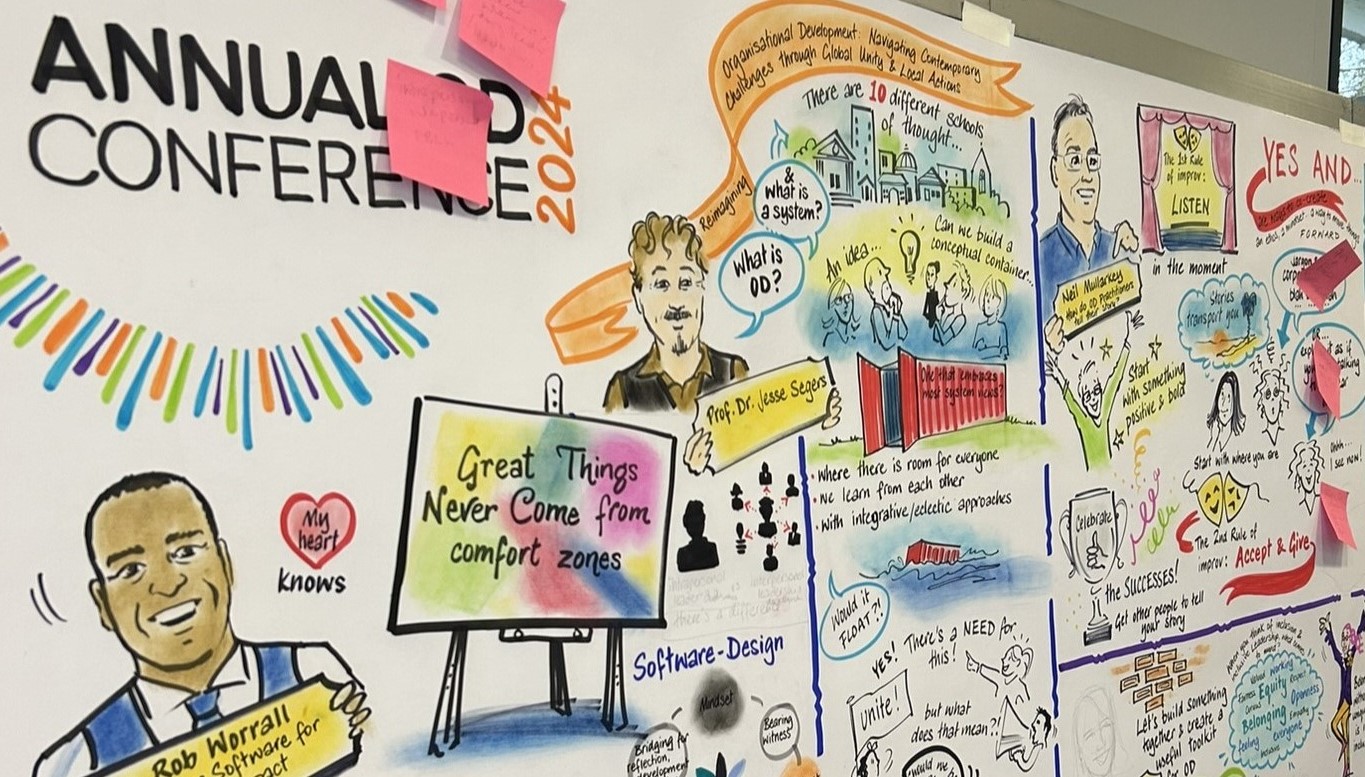
In recent years and particularly recent weeks and days, the problems we face are becoming more complex in every domain of life. Working life is clearly not immune. A so-called Fourth Industrial Revolution was already upon us, now the global corona virus pandemic has de-centred the physical workplace, collapsed demand for all kinds of goods and services and now threatens businesses across sectors and industry. Our current crises may accelerate profound social changes, raising again big questions about the nature and value of work. Reframing some of these problems as questions will help open up possibility and opportunity and in that, OD thinking and practice can help.
So how can an OD mindset and approach help to understand, navigate and perhaps even solve some of these problems? We should start right here – with the word ‘problem’. The world of work may never give up its attachment to solving a problem, nor should it. But in that attachment lies a danger of perceiving all problems as technical and reducible and therefore solvable. Some problems may not need solving and others may simply not be solvable.
One of the most important and powerful ways that an OD approach navigates ‘problems’ is by bringing together difference – different minds, different experiences and perspectives, different conversations. It’s the thoughtful and intentional connecting and understanding of these differences that generates more intelligent sense making and action around a problem. If convening is done with some skill and sensitivity, it also reduces those feelings of anxiety that, unchecked, can tip people towards an unthinking bias towards action without first seeking to understand the context. Skillful convening helps us better understand context (the ‘what’), from which emerges insight to develop appropriate responses (the ‘so what’) and then energy to implement them (the ‘now what’).
So what is meant by convening? Much has been written on the subject and there’s no set recipe, but here are three pointers.

The first is to think about who might bring a different perspective to the issue. It may not be an easy, harmonious perspective, but that’s the point. The intent here is to add in more perspectives, so that the many subjective truths of different people start to build up a fuller picture of a truth that might be more rounded and useful in finding a way through the problem.
For example, in work I have been involved in recently in the NHS, the patient’s voice has figured as much as any other. But that’s not always an easy voice to hear, just as with a ‘customer’ in any value chain. The end consumer may have frustrations and they often have a knack of putting their finger on the painfully obvious issues that staff or other stakeholders may want to avoid because of the conflicts and differences of opinion it surfaces. But from this different perspective, may also come a refreshing solution to the problem.
This points us to a second ingredient of effective convening: creating the conditions for a different quality of conversation. This draws us into the rich subject of human process dynamics but the summary for here is simply to say, people need to join a space (virtually is no different to physically), where they believe it is going to be ok to speak openly and constructively. There are a myriad of considerations in this – power relations between different group members, preparedness to contribute well, sufficient time and structure provided for the scope of the subject.
One final point, convening is important not for the sake of a nice conversation, but in order that meaning can converge to some further understanding and action. There can be a tendency as the quality of conversation deepens, for a group to lose sight of this as they realise how many things they might want to connect on, particularly in these turbulent, challenging times. So convening also needs to guide a group toward action.
Finally, convening builds and maintains those foundational qualities of interpersonal trust and respect. In an age where work is becoming increasingly fragmented and de-socialised, the importance of maintaining social connection is paramount. If good quality work (let alone discretionary effort) is sought from people, a prerequisite for that deeper engagement must be a feeling of respect, trust and understanding between people. The need for a healthy psychological contract is a base human one and always will be, whatever the challenges we face.
Beyond sense making, decision making and implementation around a problem, OD has another valuable offer to how we approach problems. The OD mindset openly accepts the unknowable and constantly changing territories of problems that we find ourselves in today. OD is orientated toward human flourishing and participative approaches, and so it instinctively keeps people ‘in’ as much as possible. This is an invaluable offer in navigating problems because it ensures that the thinking and solutions to them are owned and crafted by many smart minds, not just at the start but throughout, as goalposts (and sometimes the field of play!) inevitably move, again and again.

Perhaps this open ended, participative approach sounds soft and fluffy. However, as we say, the soft stuff is the hard stuff. Any leader who knows the work it takes (but also the benefits it brings) to create committed followership amongst a workforce knows the truth of this. OD helps leaders who want to lead like this to do it even better. And today those leaders may be finding that they need that help more than ever.
We offer Executive Open Programmes from introductory through to our MSc Qualification.
Introduction to OD Essentials: this one day programme provides an introduction to the function of OD and the role of the OD practitioner; including the key skills, knowledge and mindsets needed to become one.
OD Practitioners Programme: is highly practical and in-depth look into OD. It will equip you with a core understanding of what OD is. Improve your skills and provide you with greater awareness of your self and group process. We achieve this by bringing theory to life through practice – using your real world situations and experiences as the starting point for deep learning.
MSc in People and Organisational Development: two-year, part-time MSc qualification. This programme deepens your theoretical knowledge and practical ability to transform organisations in a holistic way which brings the people along with you. It will increase your confidence, your personal impact, effectiveness and credibility in your role either inside an organisation or as an external consultant or change management practitioner.





